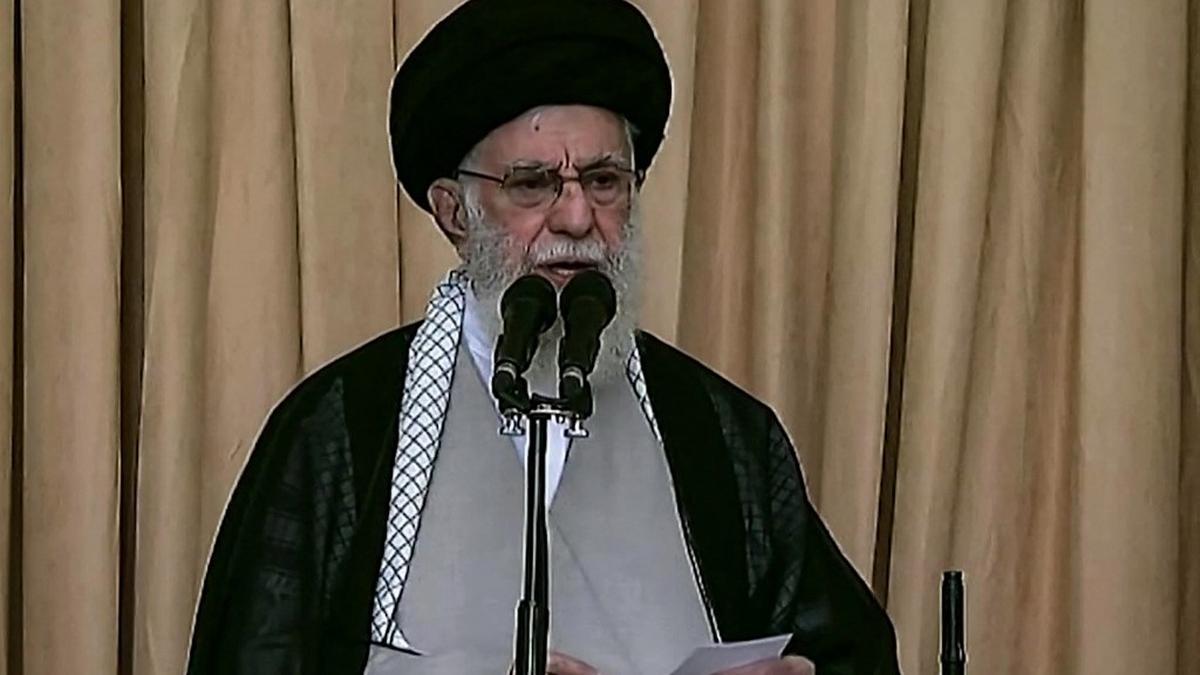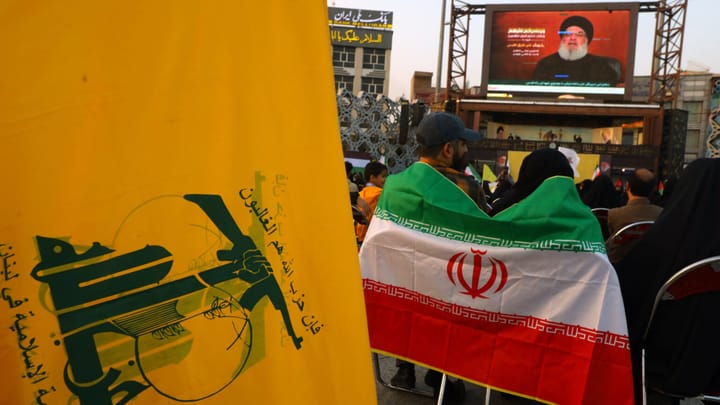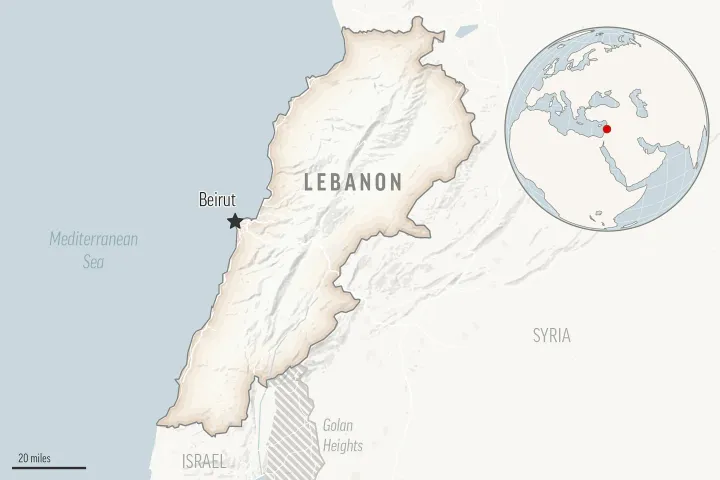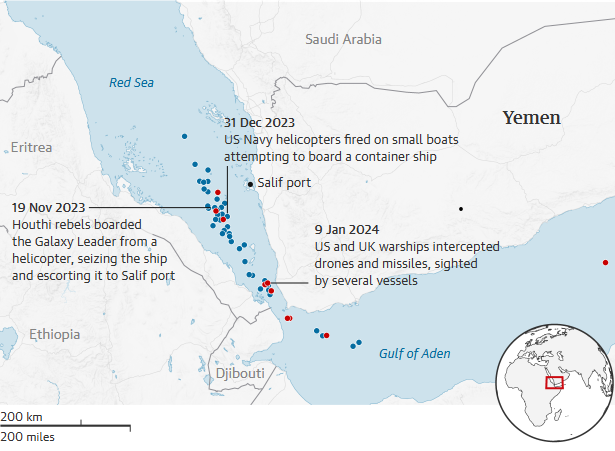Iran Has Lost Legitimacy in Leading A Peaceful Resolution of the Palestinian Issue: Analysis of Iran's Supreme Leader's Speech After the Ballistic Missile Attacks

“Palestine and Lebanon have been able to push back the Zionist regime to the position it was in 70 years ago.”
-Ayatollah Khamenei, October 4, 2024.
Iran has been involved in all the wars in the Middle East since 2011, which have claimed a million lives, most of them Muslims[1]. Israel has taken a firm position against Iran and its proxies. However, on October 7, 2023, the Iranian-backed terror group Hamas committed an act of mass murder against Israelis. The next day, another Iranian proxy, Hezbollah, started launching rockets at Israel. The Houthis in Yemen also joined in from 2,000 kilometers away with Iranian-manufactured ballistic missiles. Israel has launched operations far and wide to stop military activities by Iranian proxies directed at Israel. This article examines the ideological root of Iran's destabilizing acts by critiquing Iran’s supreme leader’s speech on October 4, three days after Iran fired a barrage of ballistic 180 missiles into Israel. It identifies the end game of Iran’s regime in the region and the vision of the Iranian mullahs for the Middle East and the rest of the world.
The Immediate Issues Before the Sermon
On October 1, 2024, Iran fired a barrage of some 180 missiles against Israel. This was in response to Israel's execution of leaders of Iranian proxy militia groups directly positioned against Israel, including Ismail Haniyeh in Tehran and Hassan Nasrallah in Lebanon.
Fearing a loss of reputation and bowing to the pressures of the populists Iran has incited for many years, they fired these ballistic missiles into Israel. Apparently, Iran knew that Israel would strike back. Knowing they have an inferior air defense system, Iran launched three diplomatic campaigns in the ten days after the attack: The supreme leader of Iran was trying to render the war against Israel a pan-Islamic problem. This is the central element of the speech under review. It is part of a broad agenda to secure Iran's leverage in the region and Islamic world while courting Russian military support.[2] and a truce from the Sunni Arab states they have fought deadly proxy wars against since 2011.
First Sermon
The Ayatollah uses the following argument plan to expand the scope of their destructive actions against Israel. This is done through the following path:
1. Emphasis on the Islamic Guardianship custom: The first section conjures the notion of Wilayah, which is the age-old practice of Islamic leaders who adopt and provide protection for other Muslims. Thus, he raises the claim that Palestinians are under the protection of all Muslims who have the means to help them. He conveniently overlooks the fact that there was a ceasefire on October 6 that was broken by a handful of people who used Iranian-made firearms to attack Israel. The wholesale invocation of the Guardianship principle incites Muslims against any attempts to maintain a Jewish presence in the region. Rather, all Muslims should rise against other Muslims without consideration of what they have done.
2. Arab Efforts to Create a Peace Plan: Sunni Arab states have sought to live beyond war and conflict. Sunni Arab states have confronted vital issues among the Palestinian leadership, including poor governance, corruption, and the misuse of violence. These are essentials in ensuring that any group of people can rule themselves and build a healthy future. Iran, which has no respect for these pointers, conjures a blank check for all Palestinian action and bad Palestinian leadership through unconditional support for violence against Israel.
3. Arrogance of Israel, America and the West: The next line of this incitement is to raise claims about how the United States are relying on their technology and arrogance to spread their beliefs in lands he considered to be Islamic lands. The Iranian regime's hatred for America is well known. They take another opportunity to take a jab at them. However, the supreme leader fails to mention the fact that Iran relies on the Russians and Chinese, who are also not Muslims. In many ways, the puritanical version of Islam the Iranian mullahs preach puts the historically atheist Russians and Chinese on a level far lower than Christian America. This is a major double standard, which shows how Russian influence has deepened in Syria and Iran – Islamic lands as Iran has led wars against members of other sects of Islam.
4. Victimization of Palestinians and Need for the Islamic Congregation (Ummah) to Rise Against Israel: The sermon moves into a discussion of how Muslims are being oppressed by Israel and killed by infidels. This creates two types of Muslim deaths in the Middle East– one caused by Muslims and the other caused by non-Muslims. Ayatollah Khamenei makes no mention of the actions that resulted in Israel's targeting of these militants. This creates an internal view of Muslim deaths and an external one. By this logic, it can be inferred that the deaths of the one million Muslims killed by Iranian-induced wars since 2011 are less severe. On the other hand, the death of Muslims who attack Israel is extremely serious and so grievous that all Muslims must rise to avenge. This is problematic and places subjective qualitative labels on war, mass violence, and human suffering. The reason for war does not seem to mean much to Iran and the Ayatollah. Who was harmed and who was hurt is not as important as the religion and nationality of who inflicted the harm. What the Iranian regime cares about is establishing its own will and policy in the region with little sensitivity to objective justice and universal principles of fairness. A global international order can function if and only if all human beings are considered equal and held responsible for their actions objectively – not based on which religion they belong to or who owns the land they live on. Coupled with the fact that Iran supplied weapons to the Palestinians, it is clear that Iran’s actions are contrary to the essence of international law and its core spirit.
5. Build on the Special Victim Class for Palestinians: With the establishment of Palestinians as a victimized class who can wage war for the land and not be touched, he goes on to consolidate their victimhood. According to the sermon, Palestinians are going to be perpetual victims. Through this, he lures the Islamic world into a Palestinian activity that, in his view, can end in a genocide of killing Israelis. If nothing is done to break the cycle, Palestinians will never have a life, and they will remain a pressure group that unpopular governments will invoke to stay in power. Iranians are very upset with this regime’s use of their national resources to wage foreign wars[3][4]. Thus, by the escalation of the Gaza War, it is possible that the Iranian regime can turn the attention from their domestic problems to focus on the people of Israel. They can also potentially unite the Islamic world only to gain leverage in their regional wars.
6. Granting Palestinian Leaders Immunity to Criticism: The Palestinian Authority openly criticized Arab states for moving closer to normalization with Israel, yet the Palestinian Authority cooperates with Israel each day to rule their territories. At the same time, the PA's reputation and credibility have been eroded among Arab states over the years through accusations of corruption and mismanagement[5]. Arab states have asked Palestinians to take more responsibility for better governance and control of corruption. It goes without saying that the age-old conception of forcing everyone to hate Israel is becoming outdated. The inability to demand accountability for Palestinian leaders does the Palestinian people no good. This sermon goes beyond these fundamental issues to entrench a perpetual Palestinian victimhood that requires the leaders of their communities to do as they wish without worrying about universal principles of governance and the application of best practices.
7. Cooption & Endangering Palestinians: As the sermon continues, Hamas' strategy of using guerilla warfare against Israel is rationalized and, in a way, justified. No single Gazan advocate – including the Ayatollah in this sermon asks Hamas to surrender or negotiate an exile. They coopt the situation and move in one extreme direction while anyone who asks for any other possibility becomes labeled as anti-Palestinian. This raises a major problem in international law and complicates a consistent mechanism of interacting with Israel in good faith. The sermon goes with a one-way condemnation of Israel, while the terrorist acts of October 7, 2023, are rationalized as follows: “It is their duty, and they should have done this. This is both an Islamic ruling, a rational law, and based on internationally accepted reasoning. The Palestinians are defending their own land. Their defense is legitimate, and supporting them is also legitimate.”[6]. This is the height of cooption and symptomatic of the attempt to shift to an extreme side that will demonize anyone who takes a middle way in the spirit of using diplomacy to resolve conflicts between states.[7]. Such a position stands in the way of any form of mediation or negotiation to end the conflict between Israel and the Palestinian people. Naturally, the Arab states that might prefer a more empowering way to get the Palestinians to rise above their current limitations will be labeled as anti-Islamic. Thus, the room for diplomatic maneuver is limited by this speech.
Second Sermon
In this section, he praises Hezbollah leader Hassan Nasrallah, who was executed by Israel a week earlier in late September 2024. He presents him as the articulate voice of the region and a representative of the Islamic world. Nasrallah had presided over a Hezbollah criminal smuggling ring[8], alleged actions linked to the execution of former Lebanese prime minister[9], Rafik Hariri, and money laundering rings in Europe and around the world[10]. The sermon renders Nasrallah as the representative of the Islamic world. This goes on to present him as another exceptional person who has numerous implications for Iran's antithetical position in contemporary international law. This is why:
1. Hezbollah under Nasrallah Killed more Muslims than any other Group of Human Beings: Since Nasrallah took over as leader of Hezbollah, war with Israel has been the alibi for his control. There were several cross-border raids by the group into Israel from 2000 to 2006 before the all-out war in 2006. The Lebanon War of 2006 saw less than 170 Israeli casualties. After that, there were isolated military exchanges between Israel and Hezbollah with minor casualties. However, in the Syrian Civil War alone, Hezbollah was involved in no less than 70 battles, operations, and offensives – most of which cost hundreds of Muslim lives. Indeed, the casualties in the Syrian Civil War are over 550,000, and Hezbollah is responsible for a significant share of the shedding of Muslim blood. In the Iraq War of 2013 to 2017, which claimed some 150,000 mostly Muslim lives, Nasrallah's Hezbollah played a leading role in many battles. That means Hezbollah caused more pain and suffering to Muslims than to Israel or members of any religion. However, in this speech, Ayatollah Khamenei showed that Muslim killings are dependent on who is doing the killing. If it is from the gun of a Muslim, it is “self-defense”. If Israel defends itself, it is “genocide”. That is the only inference from presenting a man like Hassan Nasrallah as a saintly figure.
2. Spreading Hatred and Violence Against Israel in a Totalitarian Framework: He refers to America and Israel as "tyrannical plundering devils" in the region. There is no way a 15-year-old Muslim boy listening to this speech will not support some violence against Israel. This, again, is an affront to the current international legal system, which promotes a peaceful resolution of disagreement between states. Most of this section of the speech popularizes anti-Israel sentiments and packages it as a legitimate resistance. He states that the resistance is becoming popular beyond Lebanon, Iran, and the Arab states. In reality, the popularization of a problematic act does not make it right. The Ayatollah goes further to make hatred for Israel a totalitarian ideal for all Muslims because his agenda is to enlist the support of the masses of Muslims to attain his end game of holding on to power.
3. Demonizing the Presence of America in the Region & Establishing the Islamic Cold War: The speech goes on to state that “The primary cause of war, insecurity, and backwardness in this region is the existence of the Zionist regime and the presence of governments that claim to seek peace and calm in the region.”[11] Here, he turns the tables on its head and tries to blame Israel's existence and that of other countries for destabilizing the region. This is interesting as it comes from the head of a regime that depends heavily on Russian military support and Chinese diplomatic cover. The Gulf states have modernized their systems significantly, and they are far more affluent than Iran. For someone to say such a thing, it is apparent they are starting an ideological rift that is based on their own interpretation of concepts like who triggers wars, the nature of insecurity, and what backwardness means. His suggestion of liberating the nations in the region shows that he is ready to export the regime’s ideology in ways that would cause further destabilization. This means the conflict will continue if nothing is done to stop Iran and its expansionist plans.
4. Outright Endorsement of the October 7 Massacre: Throughout the submissions, the Ayatollah has presented Hamas’ massacres as an act of “self-defense”. However, he ends the speech by presenting it as an act of resistance to 70 years of Israel's existence. This is a clear endorsement of terrorism, which is not compatible with this international legal order. It stands against coexistence and renders the Iranian regime's actions worthy of direct engagement to limit their worldview, which is highly problematic and steers the region and world to mass violence rather than peace.
Conclusion
The sermon of Ayatollah Khamenei in early October 2024 is steeped in his quest for self-preservation. His endgame is to further the regime's expansionist policy, which seeks to promote their brand of Islam ahead of the rights of many other Muslims and religious minorities in the region – including Israel as a sovereign state in the family of nations. The speech openly glorifies violence, sets the Palestinian people back significantly, and overlooks brutalities faced by Muslims through wars caused by Iran’s expansionist ideology. The speech preaches a version of Islam that embraces violence and tries to render it a totalitarian standard for all Muslims. This is highly problematic and goes against the spirit and essence of international law. This speech must be viewed as the intent and fundamental goals of this regime. The right reaction to this is to seek an objective set of standards against countries with illegitimate expansionist goals, empower Palestinians to build a functional state from the bottom up, and also promote intra-religious dialogue among Muslims to accept objective standards that can broker peace and eschew war and violence.
[1] Conservative Estimates Show that:
550,000+ died in the Syrian Civil War, 2011 to Present)
150,000+ died in the Iraqi Civil War (2013-2017)
150,000 killed, and 220,000 starved in Yemen’s Civil War (2015 to Present)
[2] Javad Heiran-Nia. "The Roots of Increasing Military Cooperation Between Iran and Russia" Stimson Center. Published: October 16, 2024. Available at: https://www.stimson.org/2024/the-roots-of-increasing-military-cooperation-between-iran-and-russia/
[3] Sanam Vakil. “Iran protests highlight its crisis of legitimacy” Chatham House. Published: September 28, 2022. Available at: https://www.chathamhouse.org/2022/09/iran-protests-highlight-its-crisis-legitimacy
[4] Eric Edelman & Ray Takeyh. “Iran’s Protesters Want Regime Change America Should Lend Them a Hand” Foreign Affairs Published: January 2, 2023. Available at: https://www.foreignaffairs.com/middle-east/iran-protesters-want-regime-change
[5] Omar Rahman. “The real threat to Palestine is a crisis of leadership” Brookings Institute. Published: February 13, 2020. Available at: https://www.brookings.edu/articles/the-real-threat-to-palestine-is-a-crisis-of-leadership/
[6] Khamenei News. "Speech delivered by Imam Khamenei, the Leader of the Islamic Revolution, on 4 October 2024 during Friday Prayers." Published: October 4, 2024. Available at: https://english.khamenei.ir/news/11146/Palestinian-and-Lebanese-Resistance-pushed-back-Zionist-regime
[7] Article 33 of the UN Charter: “Any dispute that is likely to endanger the maintenance of international peace and security should first be addressed through negotiation, mediation or other peaceful means."
[8] DW Documentary. “Unmasking Hezbollah - Drug trafficking and terror (1/3)”. Published: May 18, 2024. Available at: https://www.youtube.com/watch?v=1gDvIexJYXE&t=0s
[9] BBC News. “Hezbollah leader Nasrallah rejects Hariri indictments." Published: July 3, 2011. Available at: https://www.bbc.com/news/world-middle-east-14004096
[10] DW Documentary. "Unmasking Hezbollah - Money laundering in Europe (3/3)". Published: May 18, 2024. Available at: https://www.youtube.com/watch?v=nrltqY3xDHg&t=0s
[11] Khamenei News. "Speech delivered by Imam Khamenei, the Leader of the Islamic Revolution, on 4 October 2024 during Friday Prayers." Published: October 4, 2024. Available at: https://english.khamenei.ir/news/11146/Palestinian-and-Lebanese-Resistance-pushed-back-Zionist-regime




